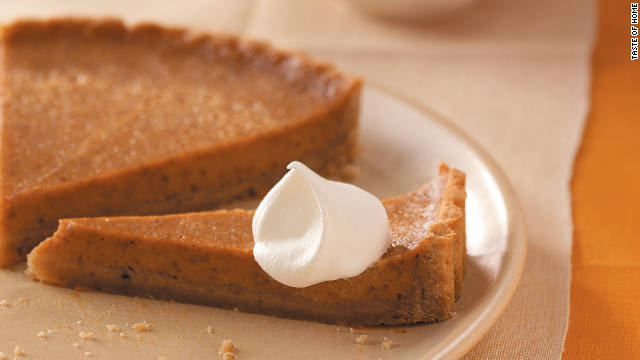By Jacque Wilson, CNN
updated 7:08 AM EST, Wed November 23, 2011

Sweet potato pie, commonly eaten on Thanksgiving, can bring about a nostalgic experience.
STORY HIGHLIGHTS
- Nostalgia comes from the Greek word for homecoming (nostos) and pain (algos)
- Nostalgic products fill a need to belong and feel socially connected
- People who are alone or disconnected feel better after engaging in nostalgia
Green bean casserole and pumpkin pie. Or sweet potato casserole and pecan pie. Cranberries. Collard greens. Stuffing.
Every year, we spend hours making the traditional Thanksgiving favorites just like our mom used to do, like her mom did before that.
"When you do something repeatedly over the years, it builds up a kind of power," nutritional psychologist Marc David says. "It creates its own momentum. To make the same dish year after year, decade after decade, there's something in that that connects us to the past."
Nostalgia comes from the Greek word for homecoming (nostos) and pain (algos). But experts say feeling nostalgic is actually good for your mental health.
Anything can bring on that special moment -- music, smells, photos. We play the same songs, cook the same recipes, take the same family photo in the same spot next to the same fireplace because we're human, David says. Our biological functions are based on repetitive rhythms. Our brains are hardwired to relax when surrounded by the familiar.
"Emotional eating has gotten a bad name," David says. "We're emotional people. We are emotional beings. We're built for pleasure."
Nostalgic products fill a need to belong and feel socially connected, according to an Arizona State University study published in the Journal of Consumer Research last year.
That's why this time of year, TV and radio ads are filled with smiling families sitting around a large table in holiday sweaters, passing the dinner rolls. Even if you're far away from home, companies want you to believe that buying those same dinner rolls will fill your heart with holiday joy. Turns out, it works.
Dr. Clay Routledge works with other researchers from the University of Southampton's nostalgia project. He recently published an article in the Journal of Personality and Social Psychology titled "The past makes present meaningful."
Nostalgia, Routledge found, increases a person's self-esteem. Daily activities like going to class or attending meetings are routine, even boring. When we engage in nostalgia, we tend to think of the things that are really important to us. That makes us feel like our life is meaningful.
Taste of Home's sweet potato tart recipe
"What's amazing about autobiographical memory is that bad memories fade faster than positive memories," Routledge says. "One thing that's interesting about nostalgia is that it's not 100% detail accurate -- it's more the highlights."
Nostalgia is largely social. Routledge' s studies found that people who are alone or disconnected feel better after engaging in nostalgia. Yet you're probably dreaming right now about your grandfather's deep-fried turkey, not about him, right?
"Is it really about the food?" Routledge asks. "Or is the food just sort of a trigger or cue for what the holidays are really all about, which is relationships. We don't eat these foods other times of the year because we've segmented them off as special. They go with this occasion. They go with the relationships."
For Taste of Home editor Catherine Cassidy, Thanksgiving means cooking for the ones she loves. She gets satisfaction in putting good food on the table for her family. So many of our best moments from the past, she says, are rooted in our sense of smell.
"We call them food memories. When it comes to the holidays we are always trying to recreate the magic and the specialness we experienced when we were children."
So indulge in a little Thanksgiving daydream. Long for the oyster stuffing. Sniff the air in anticipation of mom's pumpkin pie. Then on the big day, enjoy your holiday feast, and all the benefits that come from the power of nostalgia.

No comments:
Post a Comment